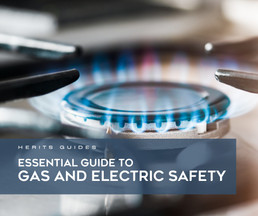27th Oct 2025
Essential Guide to Gas Safety and Electical Compliance
Why Compliance Comes First
Running a professional kitchen means more than great food and fast service. Behind every smooth operation lies a foundation of safety and compliance. Gas and electrical systems are at the heart of your kitchen’s performance—and when they’re not properly maintained or certified, they can quickly become its greatest risk.
Compliance protects your team, your customers, and your business. It’s not just a legal requirement; it’s a professional standard that signals trust, care, and competence. At Herits, we believe the safest kitchens are the most successful ones. That’s why we guide every client through the essentials of Gas Safe and electrical compliance, so you can focus on what matters most: serving with confidence.
Understanding Gas Safe Requirements
All gas work in commercial catering environments must be carried out by an engineer registered with Gas Safe Register, and certified for commercial catering categories. These categories include installation, maintenance, and repair of cookers, fryers, ovens, and other gas-fired catering appliances.
Non-compliance can lead to fines, insurance issues, or even business closure. More importantly, it puts lives at risk. Gas leaks, poor ventilation, or faulty interlocks can lead to fires or carbon monoxide poisoning. Compliance ensures systems are installed safely, regularly inspected, and fully documented.
Key Gas Safe practices for kitchen operators and caterers:
- Keep records of every gas safety inspection and service.
- Check that your engineer’s ID card lists CCC (Commercial Catering)
- Ensure interlock systems between gas and ventilation are tested and operational.
- Never alter pipework, canopies, or gas valves without certified inspection.
- Carry out annual servicing on all gas appliances.
At Herits, every gas-related installation or refurbishment meets these standards. We supply equipment that aligns with BS 6173 (Installation and Maintenance of Gas-fired Catering Appliances) and ensure all installations are handled by qualified engineers.
Electrical Compliance and Safety
Electricity drives almost every other process in a modern kitchen, from refrigeration to dishwashing. Safe electrical systems reduce the risk of shocks, short circuits, and fire. UK law requires commercial kitchens to meet the Electricity at Work Regulations 1989, ensuring all electrical installations are designed, maintained, and inspected for safety.
Essential electrical compliance steps:
- Conduct PAT testing (Portable Appliance Testing) at regular intervals.
- Schedule EICR inspections (Electrical Installation Condition Reports) every 3–5 years.
- Ensure all circuits, outlets, and isolation points are properly labelled.
- Keep electrical panels accessible and clear of obstructions.
- Report and repair any exposed wiring or overheating sockets immediately.
For caterers using refurbished equipment, Herits verifies that every item has been tested for electrical safety before delivery. All units include compliance certification, helping you maintain your records with confidence.
Ventilation and Interlocks
A safe gas system depends on effective ventilation. Extraction canopies must capture fumes and heat at the source, while make-up air systems replace what’s drawn out. Interlocks ensure that if fans fail, gas supply shuts off automatically,preventing dangerous build-up.
Every catering site should have:
- Correctly sized extraction canopies based on cooking load.
- Interlock systems linking gas valves to ventilation fans.
- Routine checks for grease filters and ductwork cleanliness.
- Certificates from qualified engineers after every modification.
Neglecting ventilation compliance is one of the most common causes of failed inspections. Herits helps you identify and fix issues early, before they become hazards.
How to Stay Audit-Ready
Auditors and Environmental Health Officers look for clear documentation. Compliance isn’t only about passing inspections—it’s about building a reliable safety culture.
Keep these documents on-site and up-to-date:
- Gas Safe Certificates and annual service records.
- Electrical test reports (PAT, EICR).
- Extraction maintenance logs.
- Staff training records for safe operation and emergency procedures.
A well-organised compliance file shows professionalism and protects you in case of incident or dispute.
When to Review Your Compliance Setup
Don’t wait for an inspection or problem to review safety procedures. Schedule a compliance review:
- After new installations or renovations.
- When expanding or relocating.
- If your kitchen layout changes.
- When equipment is replaced or upgraded.
Herits offers expert guidance on compliance readiness, helping businesses stay proactive instead of reactive.
The Herits Standard of Safety
Every piece of equipment from Herits—new or refurbished—is tested, certified, and supplied with full documentation. We work with Gas Safe registered and qualified electrical engineers to ensure installations meet every UK requirement. Our clients gain more than equipment—they gain peace of mind.
By combining safety, quality, and reliability, Herits helps caterers run kitchens that meet the highest professional standards without unnecessary stress.
Herits: trusted by professionals, built on safety.
Visit herits.co.uk to learn more about certified equipment and compliance-ready solutions for your business.

